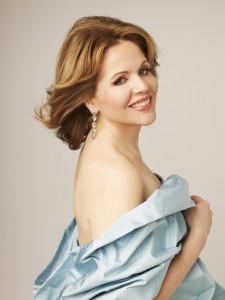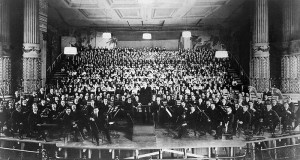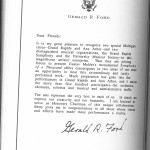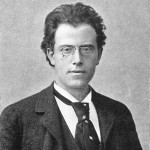UMS Announces 10/11 Choral Union Series & Piano Series
The University Musical Society is pleased to announce its 132nd Annual Choral Union Series, with 10 concerts in Hill Auditorium. The series includes:
Mariinsky Orchestra
Valery Gergiev, conductor
Denis Matsuev, piano
Sunday, October 10 | 4 pm
Hill Auditorium
Gergiev’s long association with the Mariinsky Theatre — including 10 UMS appearances, most recently the five-concert cycle of Shostakovich symphonies —has raised the ensemble’s profile to the point where it is now widely regarded one of the most dynamic and exciting ensembles on the world stage today. The fiery Russian pianist Denis Matsuev has received worldwide acclaim for his rare combination of technical virtuosity and deep musicality since his stunning victory at the 11th International Tchaikovsky Competition in Moscow in 1998. “His technique is phenomenal: blistering passagework, steely chords. Perhaps he is the new Horowitz.” (London Times)
Program
Rachmaninoff Piano Concerto No. 3 in d minor, Op. 30
Mahler Symphony No. 5
Venice Baroque Orchestra
Robert McDuffie, violin
Wednesday, October 27 | 8 pm
Hill Auditorium
The Venice Baroque Orchestra was founded in 1997 by harpsichordist Andrea Marcon and is recognized as one of Europe’s premier ensembles devoted to period instrument performance. For this UMS debut, they perform music of their home city — Venetian composer Antonio Vivaldi’s The Four Seasons — paired with an “American Four Seasons” by Philip Glass featuring violinist Robert McDuffie, who has worked closely with Glass over the years and who made his UMS debut with the Jerusalem Symphony in 2008.
Program
Vivaldi The Four Seasons, Op. 8 (1723)
Glass Violin Concerto No. 2: “The American Four Seasons”
Murray Perahia, piano
Wednesday, November 10 | 8 pm
Hill Auditorium
Anyone who has heard one of Murray’s Perahia’s previous 11 UMS appearances would have to agree with the assessment of The Los Angeles Times: “Perahia is a marvel.” In the more than 35 years he has been performing on the concert stage, he has become one of the most cherished pianists of our time. “Perahia may be the closest thing to a pure conduit of music — one in which the imagination and skill of the player are entirely at the service of the composer, not the player’s ego…The soul of a poet, the mind of a thinker, the hands of a virtuoso: No wonder audiences love this guy.” (The Seattle Times)
Program to be announced.
 Renée Fleming, soprano
Renée Fleming, soprano
Sunday, January 16 | 4 pm
Hill Auditorium
One of the most beloved and celebrated musical ambassadors of our time, soprano Renée Fleming captivates audiences with her sumptuous voice, consummate artistry, and compelling stage presence. In addition to commanding the stages of the great opera houses of the world, she hosts the Metropolitan Opera’s Live in HD Series for movie theaters and television with behind-the-scenes interviews. Her fame is such that perfumes, desserts, and flowers have all been named after her, but those superficial accolades pale in comparison to her devoted following of opera lovers around the world. This great American soprano returns to UMS after her 1997 recital and her 2005 appearance in a concert version of Richard Strauss’s Daphne.
The Cleveland Orchestra
Franz Welser-Möst, conductor
Pierre-Laurent Aimard, piano
Tuesday, February 1 | 8 pm
Hill Auditorium
Founded shortly after the end of World War I, the Cleveland Orchestra has been guided by seven music directors, each of whom has left his mark on the widely admired “Cleveland” sound: Nikolai Sokoloff, Artur Rodzinski, Erich Leinsdorf, George Szell, Lorin Maazel, Christoph von Dohnányi, and Franz Welser-Möst, who leads the ensemble and the French pianist Pierre-Laurent Aimard in this performance.
Program
Bartók Music for Strings, Percussion, and Celeste, Sz. 106, BB 114
Schumann Piano Concerto in a minor, Op. 54
Wagner Overture to Tannhäuser
Rafał Blechacz, piano
Friday, February 11 | 8 pm
Hill Auditorium
In October 2005, the 20-year-old Rafał Blechacz, an unassuming young man from a small town in northern Poland, arrived in Warsaw for the 15th International Chopin Competition. His sensational performance won not only the competition, but also all four special prizes for the polonaise, mazurka, sonata, and concerto performance — in fact, one of the judges remarked that he “so outclassed the remaining finalists that no second prize could actually be awarded.” Blechacz was the first Pole to win the prize since Krystian Zimerman 30 years earlier. Notwithstanding his young age, his playing offers poetry, maturity, poise and concentration, as well as a phenomenal and luminous technique. “How reassuring it is to see one so young putting poetry first…we were all on another planet.” (Financial Times)
Program to be announced.
 Mahler’s Symphony No. 8
Mahler’s Symphony No. 8
Detroit Symphony Orchestra
UMS Choral Union
U-M Chamber Choir
U-M University Choir
U-M Orpheus Singers
MSU Children’s Choir
Leonard Slatkin, conductor
Saturday, March 19 | 8 pm
Hill Auditorium
In commemoration of the 150th anniversary of Gustav Mahler’s birth and the 100th anniversary of his death, UMS is collaborating with the DSO and Michigan Opera Theatre to present a spectacular, not-to-be-missed performance of Mahler’s monumental Symphony No. 8, also known as “Symphony of a Thousand.” The first performance of this “choral symphony” featured a chorus of about 850, with an orchestra of 171, leading Mahler’s agent to dub to the work “Symphony of a Thousand.” While Mahler himself did not approve of the title, it nevertheless remains associated with this work, which is rarely preformed due to the massive forces required to do it justice.
Bach’s Mass in b minor
Bach Collegium Japan
Masaaki Suzuki, conductor
Thursday, March 24 | 8 pm
Hill Auditorium
Founded in 1990 by Masaaki Suzuki with the aim of introducing Japanese audiences to period instrument performance of great works of the Baroque period, the Bach Collegium Japan comprises both orchestra and chorus. The group has developed a formidable reputation through its recordings of J.S. Bach’s church cantatas, and returns to Ann Arbor after its 2003 St. Matthew Passion in St. Francis of Assisi Catholic Church. Widely regarded as one of the supreme achievements in classical music, the Mass in b minor was composed over a period of 25 years and assembled in its present form in 1749, the year before Bach died. “I have never heard period instruments played with such purity of tone, so reliably in tune. The small, precise, dramatically alert chorus breathed fire but also revealed a heartbreaking tenderness.” (The Los Angeles Times)
St. Petersburg Philharmonic
Yuri Temirkanov, conductor
Nikolai Lugansky, piano
Saturday, April 2 | 8 pm
Hill Auditorium
The Russian city of St. Petersburg boasts two world-class orchestras, and UMS has enjoyed a long relationship with each. The St. Petersburg Philharmonic has appeared in Ann Arbor five times under Yuri Temirkanov’s leadership. With a history dating back more than 200 years, the St. Petersburg Philharmonic is embedded with musical history, performing the world premiere of Beethoven’s Missa Solemnis in 1824, as well as Tchaikovsky’s Symphony No. 6, Prokofiev’s Symphony No. 1, and many works by Shostakovich. Pianist Nikolai Lugansky, who won the 1994 Tchaikovsky Piano Competition, makes his UMS debut. A Russian newspaper said of his performance in the final round of competition: “It was like getting sunstroke, a musical shock. Nobody could imagine that the soul of this unpretentious, modest young man, with his ascetic, but also poetic appearance, held such a volcano inside with inspired and resolute control.”
Program
Rimsky-Korsakov Scheherazade, Op. 35
Rachmaninoff Piano Concerto No. 2 in c minor, Op. 18
Liebeslieder Waltzes
Genia Kühmeier, soprano
Bernarda Fink, mezzo-soprano
Michael Schade, tenor
Thomas Quasthoff, bass-baritone
Malcolm Martineau, piano
Justus Zeyen, piano
Saturday, April 23 | 8 pm
Hill Auditorium
After nearly a decade in which he composed no vocal music at all, Schumann made a striking return to the genre with the Spanisches Liebeslieder song collection, which combines songs for solo voice with duets and quartets. A generation later, Brahms took the same instrumentation — vocal quartet plus four-hand piano —and composed the Liebeslieder and Neue Liebeslieder Waltzes. These three works serve the centerpiece of a program that also includes Brahms’ composition for vocal quartet and piano, performed by a brilliant quartet of musicians, including bass-baritone Thomas Quasthoff, who last appeared at UMS in a Lydia Mendessohn Theatre recital in 2000.
Program
Schumann Spanische Liebeslieder, Op. 138
Brahms Liebeslieder Waltzes, Op. 52
Brahms Four Songs from Quartets for Four Voices and Pianos, Ops. 64 & 92
Brahms Neue Liebeslieder Waltzes, Op. 65
Tickets for the 10-concert series range from $100-$650. Subscription renewal packets and brochures will be mailed in early May.
In addition to the 10-concert Choral Union Series, five events listed above will be packaged as a Piano Series (Kirov Orchestra with Denis Matsuev, Murray Perahia, Cleveland Orchestra with Pierre-Laurent Aimard, Rafał Blechacz, and St. Petersburg Philharmonic with Nikolai Lugansky). Prices for the five-concert Piano Series range from $50-$310.
Tickets to individual events on the series go on sale on Monday, August 23 (via www.ums.org) and Wednesday, August 25 (in person and by phone).
Which events in the season are you most anticipating? Let us know in the comments area below.
This Day in UMS History: Mahler’s Symphony No. 8 (March 23, 1997)
Hill Auditorium
March 23, 1997
Mahler’s Symphony No. 8
Grand Rapids Symphony
Catherine Comet, conductor
UMS Choral Union
Grand Rapids Symphony Chorus
Grand Rapids Choir of Men and Boys
Boychoir of Ann Arbor
 Leafing through the 1997 program book for a March event, this concert struck me because of two things: a letter written by Gerald R. Ford and a picture of Gustav Mahler. Ford, who was the Honorary Chairman of this collaboration between UMS and the Grand Rapids Symphony, recognized with pleasure the cities of Grand Rapids and Ann Arbor, and the organizations that made this evening possible: the Grand Rapids Symphony and UMS.
Leafing through the 1997 program book for a March event, this concert struck me because of two things: a letter written by Gerald R. Ford and a picture of Gustav Mahler. Ford, who was the Honorary Chairman of this collaboration between UMS and the Grand Rapids Symphony, recognized with pleasure the cities of Grand Rapids and Ann Arbor, and the organizations that made this evening possible: the Grand Rapids Symphony and UMS.
Even as a professional musician, there’s a shocking amount of music and music history that I simply don’t know. I have performed five Mahler symphonies (1, 2, 3, 5, and 7), but have never heard Mahler 8, arguably his most famous. Shocking, perhaps, but also wonderful to know that music is a well that will never run dry. After spending four hours rehearsing Bartók’s Fourth Quartet yesterday, I listened to his Second Quartet for the first time ever today. So reading these program notes was an educational experience for me.
Mahler 8 combines two very different texts: the medieval Catholic hymn “Veni creator spiritus” (“Come, Holy Spirit”) and a scene from Goethe’s Faust (in German, of course). The program note says:
“[Mahler] saw no distinction between humanism and religion; in the Symphony No. 8 he sought to emphasize the link between the early Christian belief in the Holy Spirit which descended on the disciples like tongues of fire. Goethe’s Faust, on the other hand, tells of man’s ascent into a god-like state, transformed from mortality and led heavenward by the ‘Eternal-Feminine.’ Goethe altered the original version of the legend so that Faust is not damned for his sins, but is redeemed through the power of Gretchen’s love. Mahler explained, ‘the essence of it really is Goethe’s idea that all love is generative, creative, and that there is a physical and spiritual generation which is the emanation of this “Eros.”’ The kinship between Platonic love and the early Christian concept of God’s love – both of them able to create, edify, and redeem – unifies these two diverse texts into a single philosophical expression.”
The great conductor Leopold Stokowski, who conducted the US premiere (1916), compared the experience of hearing it for the first time with the impression Niagara Falls must have had on the first early explorers. Mahler said: “Try to describe the whole universe beginning to ring and resound. These are no longer human voices, but planets and suns revolving.”
The heartfelt nature of this piece is indicated in a final quote from the program note:
“Mahler’s wife, Alma, once remarked, ‘Gustav is always on the telephone to God,’ to which his biographer, Michael Kennedy, added, ‘In No. 8 he was on the hot line.”



